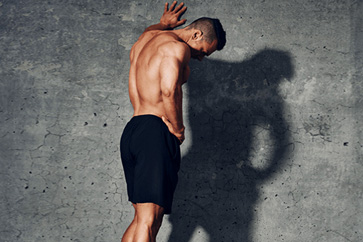6 Signs of Overtraining and Solutions
You’ve been training hard, but you’re feeling abnormally tired, having trouble sleeping, and your coaches and teammates keep asking what’s going on with you.
Sound familiar? Not to worry… the solution is way easier than you think.
The problem, however, is that most people don’t realize how badly they need a break until it’s too late. As an athlete, if you don’t take the necessary time to rest, you will eventually hit a wall. Once that happens, it can take days or even weeks to recover the drive, stamina, and motivation that you’ve lost.
Here are Six Signs of Over-training:
1. An increase in your resting heart rate.
It is a good idea as an athlete to take your pulse every day before getting out of bed. There are plenty of free apps that will measure your heart rate and keep a log of the results. But even if you don’t have one of these gadgets, you can simply monitor your morning heart rate the old-fashioned way. When you are overworked and stressed, your system will send more oxygen to your body and brain by increasing your heart rate.
2. Under performance.
You are training as hard as you can, but what you can usually do easily you find is now taking more effort.
3. Difficulty sleeping, especially after late-night training.
Are you tossing and turning around all night unable to fall sleep? Some people find that when they train closer to their bedtime, they feel too pumped with the adrenaline when the time comes to hit the sheets, while others find no issues with sleeping at all. Listen to what your body needs, and exercise earlier if possible. Or if you need to train later at night, make sure to wind down before going to bed. Warm Epsom salt baths, reading, journaling, and meditation are great ways of achieving a good night’s rest.
4. Feeling emotional after workouts.
Exercise naturally releases hormones related to happiness and a good mood, especially when you are doing what you are passionate about. If you are feeling unusually down after exercise, it could be a sign that you need to incorporate some recovery time.
5. Persistent colds, coughs, or sickness.
Exercise is supposed to boost your immune system. However, if you are overtraining you actually lower your immune system. An article by the Journal of Applied Physiology mentions that repeated exercise bouts or intensified training without sufficient recovery may increase the risk of illness. It’s important to listen to your body. It isn’t a weakness to step back and give yourself more recovery time if you need it. In fact, it’s a strength.
6. Chronic or nagging injuries.
A majority of chronic injuries involve muscle fatigue due to insufficient strength or recovery. As a result, the muscle tightens and may undergo structural damage followed by muscle spasms and shortening. This indirectly leads to muscle weakness so that recurrence of injury occurs more easily. Some simple ways of avoiding injuries caused by overuse include ensuring that you always use proper gear, warming up before and cooling down after exercising, and making sure to include proper recovery time in your routine.
Solutions to Over-training.
1. Take a break.
Take a break from training to allow time for recovery. Talk to your coach about it; they should understand when you may be doing more harm than good by training.
2. Get a sports massage.
A skillfully applied massage is one of the most effective therapies for releasing muscle tension and restoring balance to the musculoskeletal system. Getting regular massages may help athletes prevent injuries, which might otherwise be caused by overuse. Read more about the benefits of a sports massage therapist here.
3. Incorporate temperature contrast therapy.
Ice baths, hot & cold showers, etc. This uses the body’s reaction to hot and cold stimuli. Nerves at the skin carry impulses deeper into the body, where they can stimulate the immune system, improve circulation, and reduce inflammation. Plus, it influences the production of stress hormones and helps you get back your mind game.
4. Proper food intake.
When over-training the body may be depleted of various nutrients. Make sure your calorie and macros intake is optimal for your specific training. To assist in the process of recovery, it is important to ensure that you have a proper diet, and it might be a good idea to talk to your dietitian about a diet assessment.

;)



